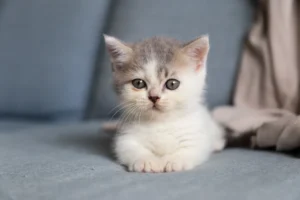Having a cat that defecates quickly can be a common concern for many pet owners. Understanding the reasons behind this behavior can provide insight into your cat’s health and well-being.
Do you ever wonder why your cat seems to defecate quickly? Here’s why your furry friend may be in and out of the litter box in no time:
Efficient Digestive System
Cats have an efficient digestive system that allows them to defecate quickly. Their digestive tract is shorter compared to other animals, helping them process food faster. Additionally, cats have a higher metabolism, which means food moves through their system relatively quickly. This streamlined process results in swift elimination, as waste doesn’t linger in their bodies for long periods of time.
Instinctual Behavior
Despite their cozy domestic lifestyles, cats still retain their instinctual behaviors from their wild ancestors. In the wild, taking their time to defecate could leave them vulnerable to predators. Hence, cats instinctively aim to defecate quickly to reduce the risk of being caught off guard. This survival tactic is deeply ingrained in their DNA, driving them to swiftly bury their waste and move on to avoid detection.
- Maintaining a clean environment is crucial for cats, as they instinctively want to avoid attracting predators with the scent of their waste.
- Cats may also defecate quickly to conserve energy and focus on more pressing matters like hunting or sleeping.
Remember, understanding your cat’s instincts and digestive system can help you provide the best care for your feline friend.
3. Diet and Nutrition
When it comes to your cat’s quick defecation, the food they eat plays a significant role. A diet rich in fiber can speed up the digestive process, leading to quicker bowel movements. Cats require a balance of protein, fats, and carbohydrates for optimal digestion. Ensure your feline friend is eating a high-quality, balanced diet to promote healthy and regular bowel movements.
Key Insight: Adding a probiotic supplement to your cat’s diet can also aid in digestion and regulate bowel movements. Consult with your veterinarian before making any changes to your cat’s diet.
4. Stress and Anxiety
Stress and anxiety can impact your cat’s digestive system, causing them to defecate quickly. Cats are sensitive creatures that can experience heightened bowel movements when feeling stressed or anxious. Changes in their environment, routine, or even the presence of new pets or visitors can trigger these reactions.
To help alleviate stress and anxiety in your cat, provide a comfortable and safe space for them to retreat to. Consider using pheromone diffusers or calming treats to help relax your furry friend during stressful times.
Additional Tip: Regular play sessions and interactive toys can help reduce stress levels in cats, promoting overall well-being and potentially slowing down their bowel movements.
5. Health Issues
When your cat defecates quickly, it could be a sign of underlying health issues. Keep an eye out for warning signs such as changes in stool consistency, frequency of defecation, or signs of discomfort during elimination.
If your cat is experiencing sudden or frequent bouts of rapid defecation, it’s essential to consult with a veterinarian to rule out any medical conditions. Conditions like gastrointestinal infections, inflammatory bowel disease, parasites, or dietary intolerances can all contribute to abrupt bowel movements in cats.
Regular veterinary check-ups, maintaining a balanced diet, and providing plenty of fresh water can help prevent health issues that may lead to rapid defecation in your feline friend. Remember, when it comes to your cat’s health, it’s always better to be proactive and address any concerns promptly.
6. Litter Box Preferences
Your cat’s choice of litter box and environment can significantly impact their defecation habits. Providing a clean, quiet, and easily accessible litter box encourages your cat to use it regularly. Some felines may prefer a particular type of litter over others, so experiment with different options to see what your cat prefers.
Consider the size and depth of the litter box as well. Cats appreciate enough space to comfortably turn around and cover their waste. Additionally, placing the litter box in a private and low-traffic area can help reduce stress and ensure your cat feels comfortable while doing their business.
Top tips for creating a cat-friendly litter box environment: 1. Provide one litter box per cat in the household, plus an extra box to prevent competition or territorial issues. 2. Regularly scoop the litter box to maintain cleanliness and prevent aversion to using it. 3. Avoid scented litter, as some cats may be sensitive to strong odors. 4. Consider using a litter box with a cover if your cat prefers privacy while eliminating. 5. Monitor your cat’s litter box habits and consult a veterinarian if you notice any sudden changes in behavior.
By understanding your cat’s preferences and providing a suitable litter box setup, you can promote healthy defecation habits and create a stress-free environment for your furry companion.
Behavioral Considerations
When it comes to understanding why your cat defecates quickly, behavioral factors play a significant role. Cats may rush through their bathroom business due to territorial marking. In the wild, cats use scent marking to establish their territory, and this behavior can translate into quick defecation indoors. Additionally, discomfort or stress can cause a cat to hurry through the process. If your cat seems anxious or uneasy, it may be affecting their defecation speed. By considering these behavioral factors, you can better appreciate why your feline friend is in a rush to do their business and address any underlying issues promptly.
Specific Insight:
1. Multi-cat Household Dynamics: If you have multiple cats in your home, competition for resources or a dominant cat could be contributing to quicker defecation. Ensure each cat has their space and resources to reduce stress and promote normal bathroom behaviors.
Remember, observing your cat’s behavior and environment can provide valuable clues as to why they are defecating quickly. By addressing any underlying causes, you can help your cat feel more comfortable and ensure their overall well-being.
Alex, a passionate animal lover, has experience in training and understanding animal behavior. As a proud pet parent to two dogs and three cats, he founded AnimalReport.net to share insights from animal experts and expand his knowledge of the animal kingdom.




